Arctic geophysics at the world's northernmost university Past Review
By Joel Wilner (Middlebury College) - abroad from 01/09/2017 to 05/31/2017 with
The University Centre of Svalbard: Longyearbyen - Direct Enrollment and Exchange
I learned about terrestrial and marine snow/ice physics. I also became a better outdoorsman, and lived in a place that I've always wanted to go. I would say it was worthwhile.
Review Photos
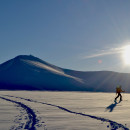
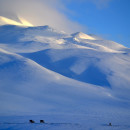
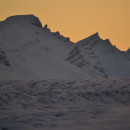
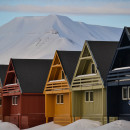
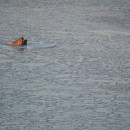
Personal Information
| How much international exposure did you have prior to this program? | 1 month - 6 months |
Review Your Program
|
* Overall educational experience
Academic rigor, intensity, resources, etc. |
Very strong academic program with top-notch field experiences and lectures from experts in their respective fields, but absurd methods of evaluation. |
|
* Host Country Program Administration
On-site administration of your program |
As a Scandinavian institution, the program is very bureaucratic and involves a great deal of red tape. |
|
* Housing:
How satisfied were you with your living arrangements? |
The housing was fine but location was an issue. Nybyen student housing is located a 35 to 40-minute walk from the university, and there is no public transportation. On the plus side, Nybyen is located closer to Larsbreen and Longyearbreen (the local glaciers) and the popular backcountry ski mountains, so it affords some great recreational opportunities. |
| * Food: |
There is one supermarket in town and it is a long walk from Nybyen student housing, and, since there is no public transportation, grocery shopping can be an ordeal. Because all food must be shipped in from the mainland, it is extremely expensive. The supermarket food itself is adequate, and there are some restaurants that serve great burgers and pub fare. |
|
* Social & Cultural Integration:
How integrated did you feel with the local culture? |
Because Longyearbyen is inherently international with people staying on average for only four years at a time, it is difficult to get a feel for the "local culture." However, |
|
* Health Care:
How well were health issues addressed during the program? |
There is a hospital on the island but it provides only basic health services. All serious health concerns require flying two hours to Tromsø in mainland Norway. Due to the long history of coal mining, air quality in town is purportedly very bad. |
| * Safety: |
The mandatory weeklong safety training session at the start of the program included rigorous hands-on Svalbard-specific training, such as avalanche rescue, crevasse rescue, rifle training, and wilderness first aid. By law, no group is allowed outside of the town without at least one rifle. Rifle safety is taken very seriously. In March, there was an avalanche that destroyed a block of houses in town (though no one was injured), and in December of 2015 an avalanche in the same part of town killed one person. Efforts are being made to improve avalanche forecasting procedures. The student housing in Nybyen is located in the red zone for avalanche runoff, and there were multiple avalanches behind the student barracks, so students will no longer be housed in Nybyen. In April, a group of Russian tourists on snowmobiles fell through sea ice in a nearby fjord and the guide died. |
| If you could do it all over again would you choose the same program? |
Yes
Though the means of assessment put a damper on the end of the semester, the unique location and the inspiring academic content made this experience worthwhile. |
Finances
|
* Money: How easily were you able to live on a student's budget?
(1 = not very easy/$200+ on food & personal expenses/week, 2.5 = $100/week, 5 = very easily/minimal cost) |
While food is very expensive compared to the US, the lack of tuition at the university is a plus. Housing is about $450 a month. |
| Not including program expenses, about how much money did you spend on food and other expenses each week? | $75 |
| Do you have any general money-saving tips for future study abroad participants? | The two airlines servicing Svalbard (SAS and Norwegian) have generous discounts for youths under 26 years old; be sure to apply those discounts when traveling to Svalbard. |
Language
| * Did your program have a foreign language component? | No |
Other Program Information
|
* Where did you live?
Select all that apply |
|
|
* Who did you live with?
Select all that apply |
|
|
* Who did you take classes with?
Select all that apply |
|
| About how many local friends did you make that you will likely keep in touch with? |
A Look Back
| * What did you like most about the program? |
|
| * What could be improved? |
|
| * What do you know now that you wish you knew before going on this program? | I wish I knew that programming (Matlab, Python) was such a large component of the academics. Also, if you ski, bring your own skis because the student equipment rental lottery system can be a pain. |
Reasons For Studying Abroad
| To help future students find programs attended by like-minded individuals, please choose the profile that most closely represents you. |
The Academic or LinguistYou went abroad with specific academic goals in mind; the program credentials and rigor of your coursework abroad were very important to you. You had a great time abroad, but never lost sight of your studies and (if applicable) were diligent with your foreign language study. Good for you! |
Individual Course Reviews
| Course Name/Rating: |
Air-Sea-Ice Interactions I |
| Course Department: | Arctic Geophysics |
| Instructor: | Dirk Notz |
| Instruction Language: | English |
| Comments: | The course content itself was challenging and interesting. However, most of the guest lecturers (who taught for a week at a time), though experts in their respective fields, were not adept at teaching and were unenthusiastic. The highlight of the course is a weeklong research cruise through the fjords of Svalbard conducting research on sea ice and ocean dynamics. The worst part of this course is definitely the manner of assessment: 100 percent of the course grade is a 45-minute oral exam, one half of which consists of the student explaining his or her report and the other half consists of three professors grilling the student on 5 months of material. I consider this a criminally unjust method of assessment because it neglects the months of hard work that the student performs throughout the semester and instead assumes that 20 minutes of high-pressure interrogation should be the sole determinant of the student's aptitude in the 5-month course. |
| Credit Transfer Issues: |
| Course Name/Rating: |
Snow and Ice Processes |
| Course Department: | Arctic Geophysics |
| Instructor: | Chris Borstad |
| Instruction Language: | English |
| Comments: | In addition to a couple months of lectures on snow physics, avalanche dynamics, glacier mechanics and glacier hydrology, the course involved two weeks of rigorous fieldwork on Tellbreen and Blekumbreen, two nearby glaciers. Fieldwork was flexible offered the opportunity for students to become engaged in in-depth individual projects. The course would benefit from more homework exercises. Assessment was 50% written field report and 50% written exam. |
| Credit Transfer Issues: |
| Course Name/Rating: |
History of Svalbard |
| Course Department: | General courses |
| Instructor: | Thor Bjørn Arlov |
| Instruction Language: | English |
| Comments: | Very interesting course that put the history of Svalbard into an accessible and fascinating context. Taught by the world's preeminent Svalbard historian, who is an entertaining lecturer, though some lectures were occasionally dry due to the nature of some topics. Assessment is a written exam. Course included a guided trip to the Svalbard Museum. |
| Credit Transfer Issues: |








